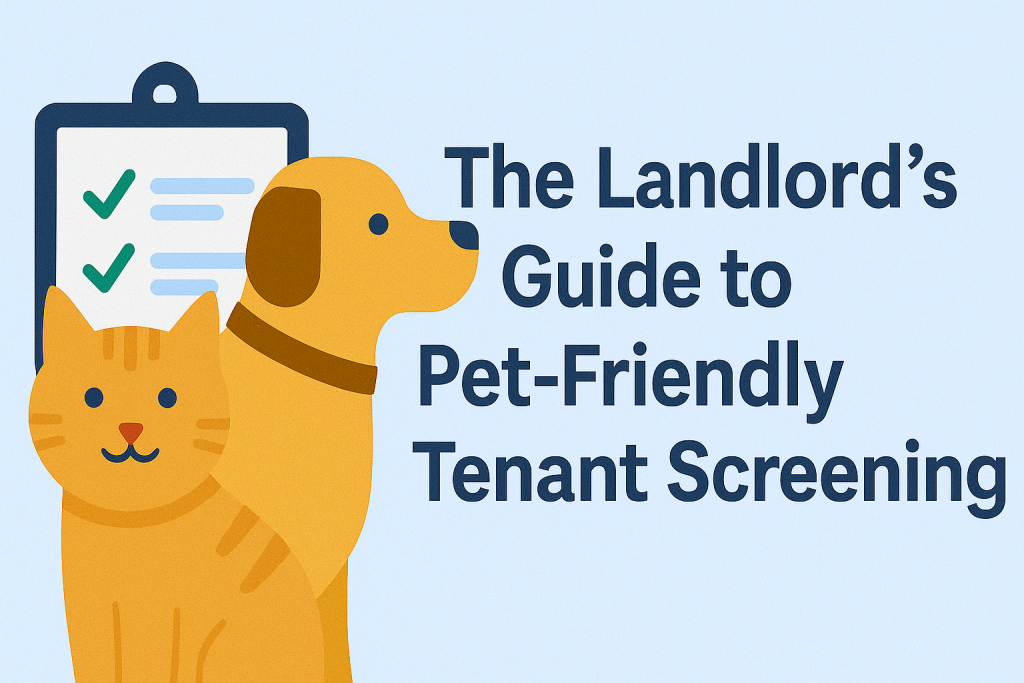
The Landlord’s Guide to Pet‑Friendly Tenant Screening
Open your doors to responsible pet owners while protecting your property. This guide covers screening steps, policy templates, fee structures, insurance considerations, and assistance‑animal compliance.
Why Go Pet‑Friendly?
Benefits
- Larger applicant pool and faster lease‑ups
- Potential for higher rent and longer tenancy
- Improved resident satisfaction and retention
Risks to Manage
- Wear and tear, noise, and neighbor concerns
- Liability and insurance coverage gaps
- Confusion about assistance‑animal rules
Set a Clear Pet Policy (Before Screening)
Write your standards and publish them with your listing. Keep them objective and consistent.
- Allowed species and maximum number per unit
- Weight or size limits (if any) — verify with local law
- Behavior expectations (housebroken, non‑aggressive, no nuisance)
- Vaccination, license, and microchip requirements
- Spay/neuter expectations where applicable
- Whether pet interviews or “meet‑and‑greet”s are required
- Fee structure: pet fee vs. refundable deposit vs. pet rent
Avoid policies that could inadvertently violate local ordinances or fair housing rules. Assistance animals are not “pets.”
How to Screen Pet‑Owning Applicants
- Pet Attestation in the Application: Ask for species, breed, age, weight, license number, vaccination dates, and training certificates.
- “Pet Resume” Upload: Invite records and references (vet, trainer, previous landlord).
- Meet‑and‑Greet (Optional): Observe behavior and handler control in common areas. Keep notes objective.
- Property Fit Check: Ensure your unit and community rules (e.g., HOA) align with the pet’s needs.
- Insurance Review: Confirm renter’s liability coverage lists animal incidents; check your own policy exclusions.
Pet Fees, Deposits, and Pet Rent
| Option | Refundable? | When It’s Used |
|---|---|---|
| Pet Fee | No | One‑time charge to offset added wear. Verify legality locally. |
| Pet Deposit | Yes | Held for potential pet damage; returned if none exists. |
| Pet Rent | N/A | Monthly charge for added occupancy/maintenance needs. |
Always check state/local rules and caps. Disclose amounts upfront and apply them consistently.
Use a Pet Addendum
- Identify each approved animal (name, description, photo optional)
- Vaccination and licensing upkeep requirements
- Noise, waste disposal, pest control, and common‑area rules
- Damage responsibility and remediation timelines
- Guest/visiting pet policy
- Grounds for revocation (repeated nuisance, undisclosed animals)
Assistance Animals: Compliance Essentials
Assistance animals are not pets. This category includes service animals and emotional support animals (ESAs) under fair housing rules.
- No pet fees, pet rent, or pet deposits for assistance animals
- Request reliable documentation from a licensed healthcare professional when disability/need isn’t obvious
- Apply the process consistently; avoid invasive medical questions
- You may charge for actual damage caused by the animal (like any resident)
When in doubt, consult local counsel—requirements and forms vary by jurisdiction.
Risk Mitigation & Property Care
Preventive Steps
- Hard‑surface flooring in high‑traffic areas
- Regular common‑area cleaning and waste stations
- Quarterly filter changes and maintenance checks
- Clear noise and leash rules in house guidelines
During Tenancy
- Annual pet document refresh (vaccination/licensing)
- Periodic inspections per lease terms
- Quick response to complaints with written follow‑up
- Offer training resources for minor behavior issues
Sample Questions for Pet Owners
• How long have you owned your pet?
• Any prior damage or noise complaints? (Can your previous landlord confirm?)
• Typical exercise routine and feeding schedule?
• Crate trained or housebroken? Any training certificates?
• Who cares for the animal when you’re away?
Approve Great Residents—Including Responsible Pet Owners
Run fast, compliant screenings with credit, criminal, and eviction data—plus customizable pet questions and addendum templates.
FAQs
What’s the difference between a pet fee, deposit, and pet rent?
A pet fee is usually non‑refundable, a pet deposit is refundable for damage, and pet rent is monthly. Confirm what’s permitted in your state and disclose terms upfront.
Can I charge for assistance animals?
No pet fees or pet rent for assistance animals. You can recover costs for actual damage. Keep your documentation process consistent and lawful.
How do I handle breed concerns?
Some insurers or local rules restrict certain animals. Focus on behavior, documentation, and liability coverage; avoid blanket policies where restricted. Always check local law and insurance terms.

